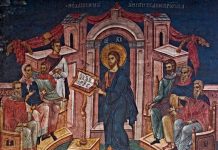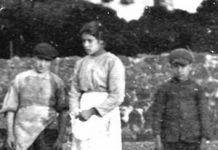“Pray always.” (1 Thessalonians 5.17)
If we are to take Saint Paul’s words seriously, we see that there must be different forms of prayer; we can’t be on our knees or in church all the time. And given that fact, we are immediately invited to put these forms in some sort of order, starting with the method of prayer that is appropriate for beginners and progressing to contemplation, which mystics talk about. There is something else to note about prayer. Not only is there an ordering in the various ways in which we pray, but as one rises to higher forms he does not abandon the simpler ones. Consequently, the prayers of the proficient will include the same sort of prayer as beginners but now, of course, enriched by his fuller experience.
The most elementary form of prayer is vocal prayer, i.e., repeating set forms such as the Our Father or the prayers at Mass. And these, obviously, are the sorts of prayer that busy people can use. How long does it take to say an Our Father or a Hail Mary? And as Catholics we attend Mass every Sunday. All we have to do is be attentive to what the priest and the congregation are saying. You can see now what I meant when I said that the first level of prayer continues in use at all the other levels. No saint, however high he ascends towards God, ever abandons the Our Father or stops attending Mass. Properly used vocal prayer can leads the devotee to the sublime heights of union with God, but the best reason for using set prayers is that they have been given to us by God. This statement is most obviously valid with regard to Mass in its use of traditional prayers and the Bible, as in the readings and the responsorial Psalm. The last of these is a neglected part of the liturgy, but upon examination the Psalter can be recognized as a manual of piety and of prayer.
To begin with, Psalms are poetry and consequently use highly charged, dramatic language. Consider Psalm 128/129:
Sorely have they afflicted me from my youth,
yet they have not prevailed against me.
The ploughers ploughed upon my back;
they made their furrows long.
Can you imagine a more vivid way of describing the misery of oppression? It’s a powerful metaphor, and we need a variety of metaphors to represent the unfathomable richness of the divine reality. That is why the Bible abounds in them. Further, the conventions of Hebrew poetry are different from ours. Instead of rhythm and rhyme, it uses repetition with variation. Psalm 128/129 begins, “The ploughers ploughed upon my back,” and then it repeats the idea in different words: “they made their furrows long.” You could open the Psalter almost at random to find other instances of this device, as in, e.g., Psalm 94/95. It begins, “O come, let us sing to the Lord!” and then varies the exhortation: “Let us make a joyful noise to the rock of our salvation!”
Using the Psalms teaches us a fundamental principle of all prayer, viz., repetition. It also shows us that there are two ways of repeating. The first is what I have called repetition with variation, i.e., saying the same thing with different words. The second is to use the same words, but varying our attitude each time we repeat them. If you think about it, you can see that to say a phrase two or three times is not the same as saying it once. “I love you”—or “I hate you”—if repeated gains tremendously in intensity: I hate you; I hate you; I HATE YOU! That is why we say “Lord have mercy” over and over again at the beginning of Mass. We really mean it or, at least, we should. Similarly, we repeat, “Lamb of God, who takes away the sins of the world, have mercy on us” at Holy Communion because we want that forgiveness before daring to receive the host. There are also many prayers that are the same in every Mass: “Lord have mercy,” “Holy, holy, holy,” the “Our Father,” and so on. To pray with the Church is to accept that these are sentiments that we can repeat over and over again without exhausting their meaning. Each time I attend Mass I bring a new way of understanding their significance for the Christian life, just as each year, at Christmas or Easter, say, I am a different person responding to the announcement of Christ’s coming or of his saving death and resurrection.
During Lent we are expected to commit ourselves to more frequent prayer. A habit of prayer thus formed will lead one to spend more time in prayer, combined with a personalizing of, especially, the Psalms. People who pray will find themselves moving beyond repeating prayers into other, highly personal forms of prayer., such as the habitual awareness of the presence of God—clearly a form of “praying always.” The culmination of this spiritual journey, reached for some mystics here on earth and by everyone who enters heaven, is the prayer of union. Saint Teresa of Avila and Saint John of the Cross remain the honoured guides into these exalted regions.










